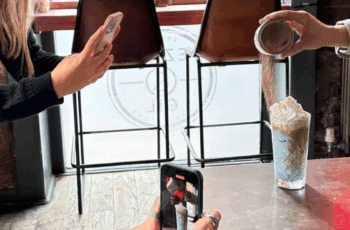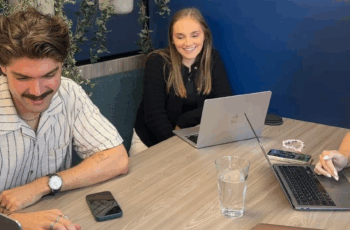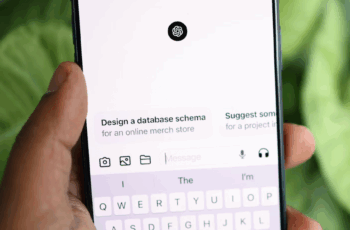Commercialising Creativity – Eliminating ‘Us and Them’
We were thrilled to be invited to join a pro-manchester debate on commercialising creativity. Led by Daniel Nolan of theEword, the panel consisted of Mike Griffiths from Seventy7, Derek Boyles from Shop Direct, Michele Henshaw of The BatShit Crazy Foundation and our Director, Kelly Gilmour-Grassam.
It was a chance to put the world to rights on the constant battle of suits vs. creatives, as well as share insights on how creativity can be aligned to business objectives, data, and the processes of both small and large organisations.
But first, Daniel kicked off the conversation by asking ‘How should creativity be used within the commercial sector?’
“For me, it’s about problem solving” answered Mike. Creative thinking highlights solutions to commercial matters. Agreeing, Kelly added that “creativity should be used as a platform for ideas and innovation.”
On putting this in practice, Derek and Michele honed in on the suits vs creatives divide. Derek noted that the problem lies in everyone wanting to take the glory. Michele supported this notion by suggesting that true creativity was successful collaboration between departments, which would in turn create commercial and creative wellbeing.
Next, Daniel turned to Kelly to find out how she commercialised creativity through the establishment of MYC…
“I started out as a freelancer. While my success came from aligning content to clients’ business goals, I think a challenge has definitely been hiring employees who aren’t necessarily commercially knowledgeable to start with.”
“It’s hard to build a team that can immediately get on board with a client’s aims,” she explained. “Not every brief needs Shakespeare – it’s about delivering on the brief within a reasonable timeframe.”
“[The team] need to be able to mould creativity to business objectives. This is why I usually connect clients directly to the writer who will be working on their account.”
Moving along to changes in the sector, Daniel asked: Do you think data will kill creativity?
This prompted strong reactions from the panellists. Mike argued that “…for those that want to rely solely on data then yes: it will kill creativity. But creatives will just use the information to enhance their work.”
Derek pressed further into the nature of data-led marketing. He believes fundamentally creatives work best when educating marketing efforts with data. Although, balancing this, Michele added that “data must enhance creativity, not dictate it.”
So, what advice would the panel give to businesses struggling to embrace creativity?
Mike stated that the most important means of embracing creativity was to “trust the creative.” Clients should have implicit faith in the creative and that they are acting in the best interests of the brand.
Kelly explained how discovery sessions unlock creative thinking within the organisations MYC support, which in turn reduces resistance from stakeholders later on. “There is always a learning curve with businesses. These sessions help determine what works for them, which might lead to an outcome quite different to what they originally had asked for.”
Mike agreed with Kelly and added that this approach is what secures trust in the client relationship – having the strength to be honest and brave throughout the brief.
Derek championed the confident creative. He argued that it was important to be bold and not to feel shunned by not being invited to the boardroom. Instead, creatives should call the meetings themselves and take control of the conversation.
Finally, Michele stressed that it was important to remember why a business sought creative input in the first place. They should evaluate what they wanted to achieve. In order to cultivate success, business owners should actively “encourage courage.”
Lastly, the discussion was thrown out to attendees…
As Daniel opened the debate up to the audience, the majority of questions and comments were in support of the adoption of data to educate marketing efforts. It was also noted that cultural fit is key when bringing creatives and ‘suits’ together.
The final question focused on whether or not it was better to work with small or large clients as a creative. While the discussions had flagged up the bureaucracy of bigger organisations, Kelly noted that they are often more experienced with the outsourcing relationship. Would this make them less precious when presented with bold ideas?
It was encouraging to hear so many enthusiastic voices at the Eagle Labs event. It’s clear that understanding the balance between commercial goals and creative thinking leads to business growth and harmony.
Thanks again to pro-manchester for the invitation to participate in the panel, and to the attendees who helped keep the conversation optimistic and forward thinking!




